
Interwar poverty in Britain
Encyclopedia
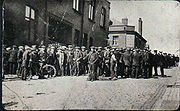
United Kingdom
The United Kingdom of Great Britain and Northern IrelandIn the United Kingdom and Dependencies, other languages have been officially recognised as legitimate autochthonous languages under the European Charter for Regional or Minority Languages...
between the end of World War I in 1918 and the start of World War II in 1939. Unemployment was the dominant issue of British society during the interwar years Unemployment levels rarely dipped below 1 million and reached a peak of 3,000,000 in 1931, a figure which represented 20% of the working population. The Government deployed unemployment insurance schemes in 1920 to alleviate unemployment.
Causes
There were several reasons for the decline in industry after the First World War. The end of World War I brought a postwar boom. In the Shipping industry businesses expanded rapidly in order to take advantage in the increase in business. However the boom was short lived and this rapid expansion caused a slump from oversupply. Structural weaknesses in the British economy meant a disproportionate number of jobs were in the traditional industries. A lack of pre-war technological developments and post war competition damaged the economy and the new industries which emerged employed fewer people. At the same time Britain began to lose her oversees markets due to strong foreign competition. Some have argued than an overly generous unemployment insurance system worsened the state of the economy. The Wall Street Crash in 1929 was responsible for a world wide downturn in trade and led to the Great DepressionGreat Depression
The Great Depression was a severe worldwide economic depression in the decade preceding World War II. The timing of the Great Depression varied across nations, but in most countries it started in about 1929 and lasted until the late 1930s or early 1940s...
.
Liberal Party
As the Government had funded World War I largely through borrowing, Britain had run up a large national debt. A boom in the economy occurred in 1919 causing unemployment rates to decrease. The boom stopped in 1920 when unemployment began to increase, by the time that the Liberals lost power in 1922 the unemployment rate had reached 2.5 million. A committee on unemployment was set up in 1920 and recommended public works schemes to ease unemployment, this led to the establishment of the Unemployment Grants Committee. As unemployment was not uniform across Britain it was decided to concentrate schemes in areas of the country that were particularly affected by the downturn. However the government wished, also, to return to the gold standard, a move which would have required cuts in public spending. In Unemployment Insurance Act 1920Unemployment Insurance Act 1920
The Unemployment Insurance Act 1920 was an Act of Parliament in the United Kingdom. It extended unemployment benefits to most manual workers and lower-paid non-manual workers from the age of 16....
extended unemployment benefits to cover all workers who earned less than £250. The "Seeking Work Test" was introduced in 1921, it stated to receive full unemployment benefit there had to be evidence the recipient was looking for work.
Conservative policy
The 1927 Unemployment Insurance Act returned to the principle that workers had to contribute to insurance schemes in order to be a part of them. The workhouseWorkhouse
In England and Wales a workhouse, colloquially known as a spike, was a place where those unable to support themselves were offered accommodation and employment...
system was abolished and replaced with a system of Public Assistance Committees
Public Assistance Committees
Public Assistance Committees were the bodies created after the abolition of Board of Guardians in 1930 when workhouses were also abolished. Public Assistance Committees inherited responsibility for the administration of poor relief....
.
Labour Policy
Ramsay MacdonaldRamsay MacDonald
James Ramsay MacDonald, PC, FRS was a British politician who was the first ever Labour Prime Minister, leading a minority government for two terms....
's Government passed the Development (Loan Guarantees and Grants) Act of 1929.
National Government
In 1931 a National Government formed after Cabinet splits resulting from the financial crisis. National Governments would stay in power from 1931-1940 until Winston Churchill became Prime Minister of a Coalition Government during World War II.Local government was reorganized so that local authorities provided school dinners and health services, means testing was introduced and the Unemployment Assistance Board
Unemployment Assistance Board
The Unemployment Assistance Board was a body set up in Britain in 1934 due to the high levels of inter-war poverty in Britain. The Board kept a system of means tested benefits and did widen the number of people who could claim relief....
was set up in 1934. Economic measures included the devaluation of the pound and taking Britain's currency off of the gold standard, borrowing also increased. The Special Areas Act
Special Areas Act 1934
The Special Areas Act was an Act of Parliament which gave aid to the areas of Britain which had the highest unemployment rates in the 1930s. Areas which benefited included South Wales, Tyneside, Cumberland and southern Scotland; but not Lancashire. There were two unpaid commissioners given...
of 1934 attempted to inject finance into depressed areas and British industry was protected by protectionist measures such as state subsidies and import quotas.The 1934 Unemployment Act Part I increased the numbers covered by unemployment insurance and the Special Areas Act 1934
Special Areas Act 1934
The Special Areas Act was an Act of Parliament which gave aid to the areas of Britain which had the highest unemployment rates in the 1930s. Areas which benefited included South Wales, Tyneside, Cumberland and southern Scotland; but not Lancashire. There were two unpaid commissioners given...
increased support for those areas of Britain which were considered to be worst hit by the depression.
Prime ministers
All three of the major political parties held power during this period. The first Labour Government came to power in 1924 and a National Government was formed in 1931.| Portrait | Name | Entered office | Left office | Political party | Other ministerial offices held while Prime Minister | Monarchs served | Birth Place | Refs | |
|---|---|---|---|---|---|---|---|---|---|
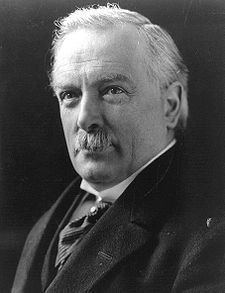 |
David Lloyd George David Lloyd George David Lloyd George, 1st Earl Lloyd-George of Dwyfor OM, PC was a British Liberal politician and statesman... |
7 December 1916 | 19 October 1922 | National Liberal National Liberal Party (UK, 1922) The National Liberal Party was a liberal political party in the United Kingdom from 1922 to 1923. It was led by David Lloyd George and was, at the time, separate to the original Liberal Party.-History:... |
First Lord of the Treasury | George V George V of the United Kingdom George V was King of the United Kingdom and the British Dominions, and Emperor of India, from 6 May 1910 through the First World War until his death in 1936.... |
Manchester | ||
 |
Andrew Bonar Law | 23 October 1922 | 20 May 1923 | Conservative Conservative Party (UK) The Conservative Party, formally the Conservative and Unionist Party, is a centre-right political party in the United Kingdom that adheres to the philosophies of conservatism and British unionism. It is the largest political party in the UK, and is currently the largest single party in the House... |
First Lord of the Treasury & Leader of the House of Commons |
George V | Rexton, Kent County, New Brunswick, Canada | ||
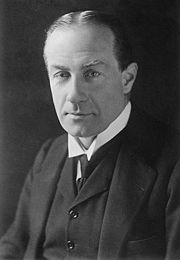 |
Stanley Baldwin Stanley Baldwin Stanley Baldwin, 1st Earl Baldwin of Bewdley, KG, PC was a British Conservative politician, who dominated the government in his country between the two world wars... (1st ministry) |
23 May 1923 | 16 January 1924 | Conservative | First Lord of the Treasury, Leader of the House of Commons & Chancellor of the Exchequer (1923) |
George V | Bewdley, Worcestershire | ||
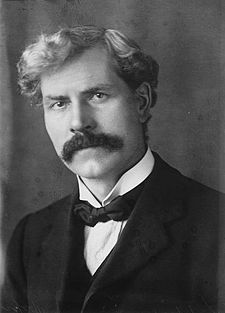 |
Ramsay MacDonald Ramsay MacDonald James Ramsay MacDonald, PC, FRS was a British politician who was the first ever Labour Prime Minister, leading a minority government for two terms.... (1st ministry) |
22 January 1924 | 4 November 1924 | Labour Labour Party (UK) The Labour Party is a centre-left democratic socialist party in the United Kingdom. It surpassed the Liberal Party in general elections during the early 1920s, forming minority governments under Ramsay MacDonald in 1924 and 1929-1931. The party was in a wartime coalition from 1940 to 1945, after... |
First Lord of the Treasury, Leader of the House of Commons & Secretary of State for Foreign Affairs |
George V | Lossiemouth, Moray | ||
 |
Stanley Baldwin (2nd ministry) |
4 November 1924 | 5 June 1929 | Conservative | First Lord of the Treasury & Leader of the House of Commons |
George V | Bewdley, Worcestershire | ||
 |
Ramsay MacDonald (2nd ministry) |
5 June 1929 | 24 August 1931 | Labour | First Lord of the Treasury & Leader of the House of Commons |
George V | Lossiemouth, Moray | ||
 |
Ramsay MacDonald (3rd ministry) |
24 August 1931 | 7 June 1935 | National Labour (National Government UK National Government In the United Kingdom the term National Government is an abstract concept referring to a coalition of some or all major political parties. In a historical sense it usually refers primarily to the governments of Ramsay MacDonald, Stanley Baldwin and Neville Chamberlain which held office from 1931... ) |
First Lord of the Treasury & Leader of the House of Commons |
George V | Lossiemouth, Moray | ||
 |
Stanley Baldwin (3rd ministry) |
7 June 1935 | 28 May 1937 | Conservative (National Government UK National Government In the United Kingdom the term National Government is an abstract concept referring to a coalition of some or all major political parties. In a historical sense it usually refers primarily to the governments of Ramsay MacDonald, Stanley Baldwin and Neville Chamberlain which held office from 1931... ) |
First Lord of the Treasury & Leader of the House of Commons |
George V, Edward VIII Edward VIII of the United Kingdom Edward VIII was King of the United Kingdom and the Dominions of the British Commonwealth, and Emperor of India, from 20 January to 11 December 1936.Before his accession to the throne, Edward was Prince of Wales and Duke of Cornwall and Rothesay... , George VI George VI of the United Kingdom George VI was King of the United Kingdom and the Dominions of the British Commonwealth from 11 December 1936 until his death... |
Bewdley, Worcestershire | ||
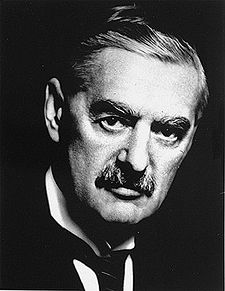 |
Neville Chamberlain Neville Chamberlain Arthur Neville Chamberlain FRS was a British Conservative politician who served as Prime Minister of the United Kingdom from May 1937 to May 1940. Chamberlain is best known for his appeasement foreign policy, and in particular for his signing of the Munich Agreement in 1938, conceding the... |
28 May 1937 | 10 May 1940 | Conservative (National Government UK National Government In the United Kingdom the term National Government is an abstract concept referring to a coalition of some or all major political parties. In a historical sense it usually refers primarily to the governments of Ramsay MacDonald, Stanley Baldwin and Neville Chamberlain which held office from 1931... ) |
First Lord of the Treasury & Leader of the House of Commons |
George VI | Birmingham, West Midlands | ||
Legislation
- Unemployment Insurance Act 1920Unemployment Insurance Act 1920The Unemployment Insurance Act 1920 was an Act of Parliament in the United Kingdom. It extended unemployment benefits to most manual workers and lower-paid non-manual workers from the age of 16....
- Unemployment Insurance Act 1921Unemployment Insurance Act 1921The Unemployment Insurance Act 1921 was an Act of Parliament in the United Kingdom. The Act stated that Under-18s were to receive less unemployment benefits than adults and females would receive less than males....
- Unemployment Insurance Act 1924Unemployment Insurance Act 1924The Unemployment Insurance Act 1924 was passed when the British Labour Party was in power in 1924.The Act arose from a dispute over the means testing of benefits. The Labour Cabinet disagreed on whether means testing should be abolished or whether such a move would prove too costly...
- Unemployment Insurance Act 1927Unemployment Insurance Act 1927The Unemployment Insurance Act 1927 was an Act of the Parliament of the United Kingdom passed by the Conservative Party in 1927. It reintroduced means testing for some benefits. One of the more controversial proposals was to raise Treasury contributions to that made by employers and workers, this...
- Unemployment Insurance Act 1930Unemployment Insurance Act 1930The Unemployment Insurance Act 1930 was passed in the United Kingdom in response to the economic problems emerging due to the Wall Street Crash and Great Depression. It substantially reformed the benefits system and abolished the rule that those claiming benefits must genuinely be seeking work....
- Coal Mines Act 1930Coal Mines Act 1930The Coal Mines Act 1930 was an Act of Parliament which introduced a system of quotas in the coal industry of the United Kingdom. Under the legislation companies were only allowed a certain market share of the coal industry in order to restrain competition....
- Import Duties Act 1932Import Duties Act 1932The Import Duties Act 1932 was an Act of United Kingdom Parliament. The Act introduced a general tariff of 10% on all imports except foodstuffs and raw materials...
- Unemployment Act 1934Unemployment Act 1934The Unemployment Act 1934 was an Act of Parliament in the United Kingdom, reaching statue on 28 June 1934. It reduced the age at which a person entered the National Insurance scheme to 14 and made the claiming age 16 years. It also separated benefits earned by paying National Insurance and those...
- Special Areas Act 1934Special Areas Act 1934The Special Areas Act was an Act of Parliament which gave aid to the areas of Britain which had the highest unemployment rates in the 1930s. Areas which benefited included South Wales, Tyneside, Cumberland and southern Scotland; but not Lancashire. There were two unpaid commissioners given...
- British Shipping (Assistance Act) 1935British Shipping (Assistance Act) 1935The British Shipping 1935 was an Act of Parliament which subsidized the British shipping industry. £10,000,000 was given to allow the building or modernization of tramp markets....
- Cotton Industry (Reorgainsation) Act 1936
- Special Areas (Amendment) Act of 1937Special Areas (Amendment) Act of 1937The Special Areas Act of 1937 was an Act of the Parliament of the United Kingdom which amended the Special Areas Act 1934. The new Act introduced concessions on taxes and rents to encourage businesses to set up in the locations which benefited from the 1934 Act....
- Cotton Industry (Reorgainsation) Act 1939
Unrest
There were several examples of unrest during this period, most notably the General StrikeGeneral strike
A general strike is a strike action by a critical mass of the labour force in a city, region, or country. While a general strike can be for political goals, economic goals, or both, it tends to gain its momentum from the ideological or class sympathies of the participants...
of 1926 and the Jarrow March
Jarrow March
The Jarrow March , was an October 1936 protest march against unemployment and extreme poverty suffered in North East England. The 207 marchers travelled from the town of Jarrow to the Palace of Westminster in London, a distance of almost , to lobby Parliament...
of 1937. There were also protests against the introduction of means testing and hunger marches organized by the National Unemployed Workers Movement.

